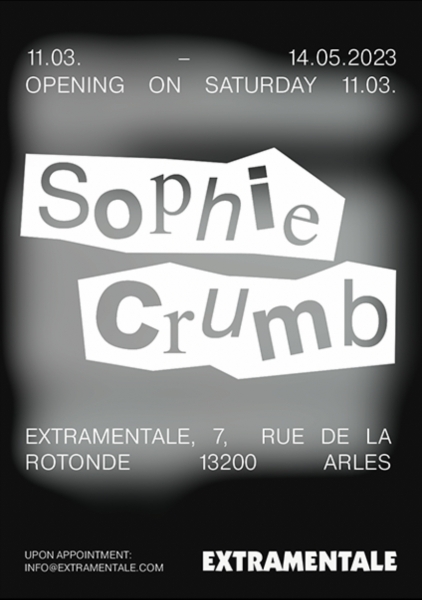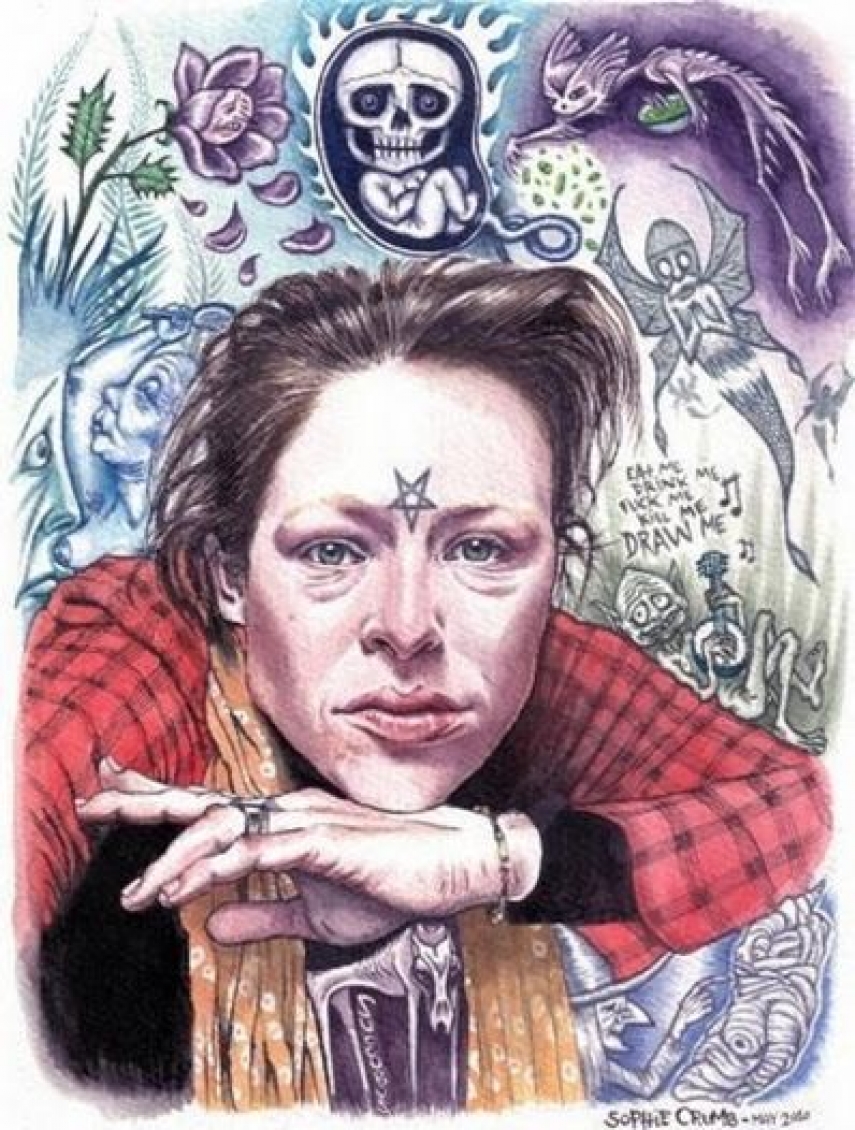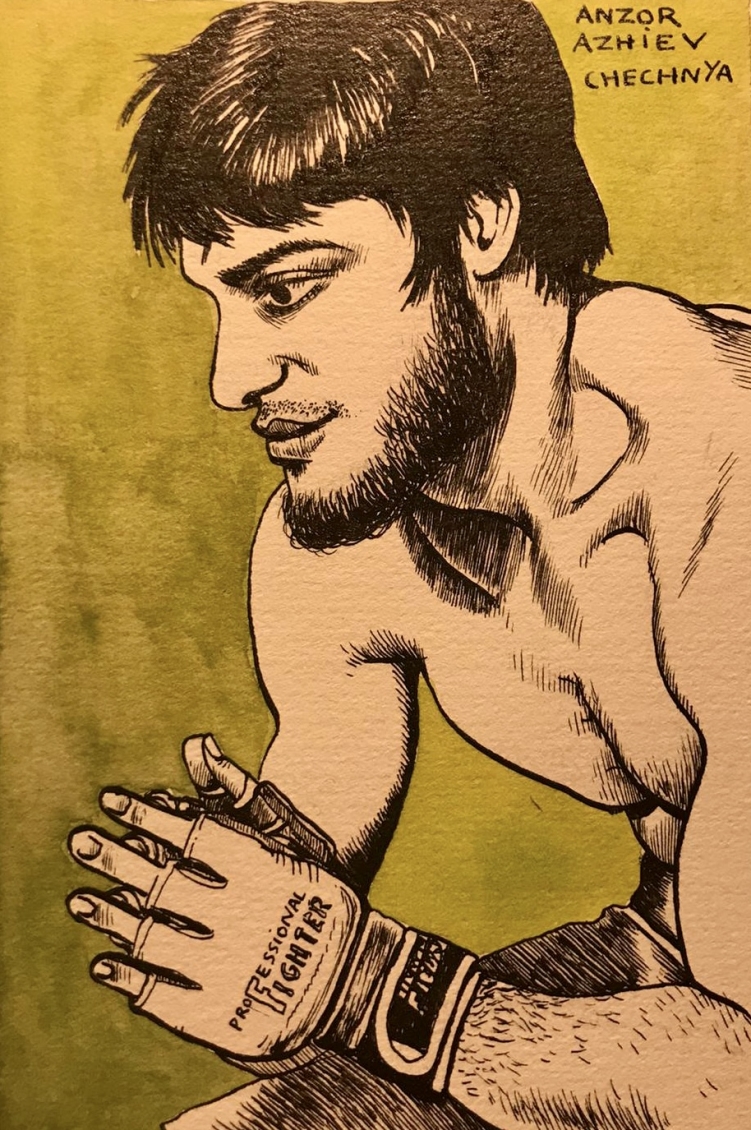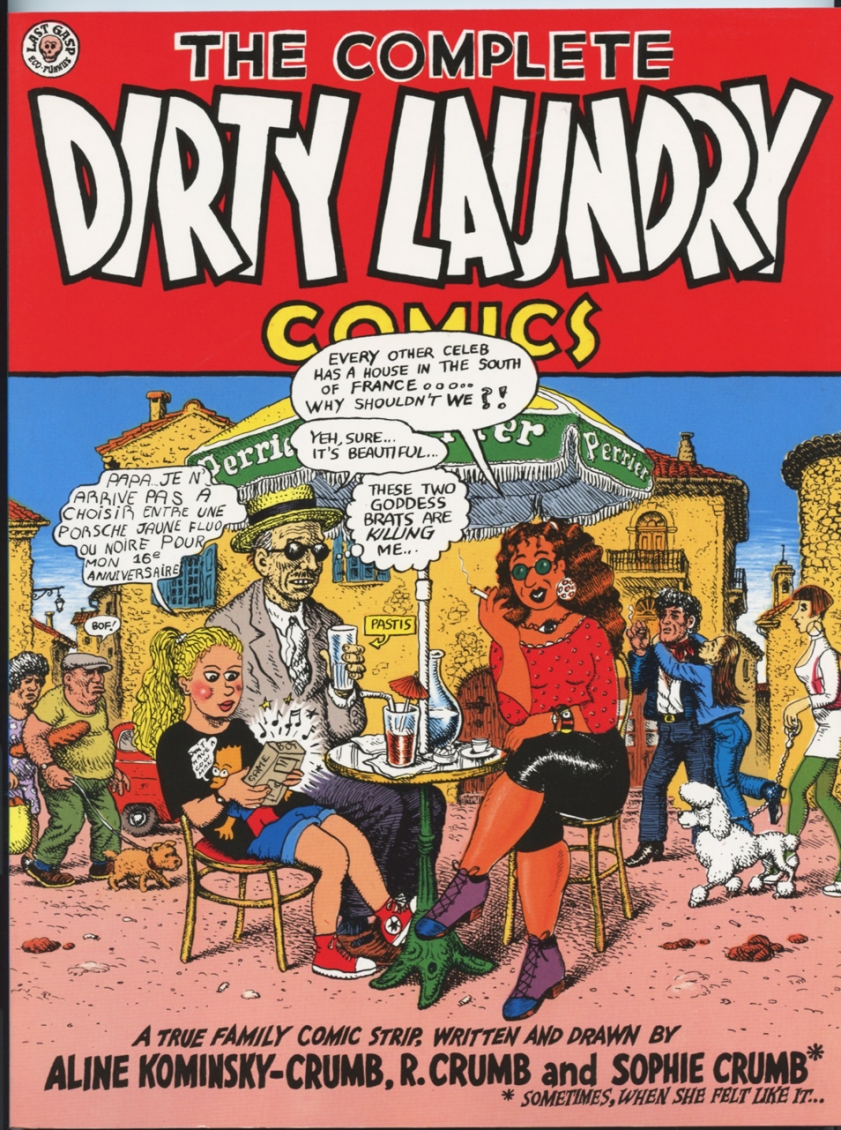Solo show of Sophie Crumb , March 11 - May 14 2023
Opening on Saturday March 11 from 4 to 7 pm - and upon appointment info@extramentale.com
Clotilde Viannay : Hello Sophie Crumb, Extramentale analyses contemporary creation through the prism of adolescence, if you agree, I would like to discuss this issue with you with regards to your practice
Sophie Crumb: Talking about adolescence fits me perfectly! I've just come out of a regressive period, a sort of mid-life crisis of frightening banality. I've had three children and my last ten years have been stuck in early childhood: the chicken coop, the vegetable garden, knitting, cloth nappies. When my youngest kid was seven, I felt a strong need to escape from this routine, to go out with my friends, to play music again, to be in Paris - I was allergic to the city - in short to live!
In November 2021, I got the covid and was confined for a fortnight with my children. During this forced retreat, Instagram's algorithms brought up an image of a Chechen MMA fighter. I was [artistically] obsessed with this man - Anzor is his name - beautiful with big black eyes, straight hair, a strong Caucasian streak, a mix of Arabic and Russian, a warrior's rage in his eyes. I sketched him in movement, a dynamic drawing fed by many details in the face. The placement of his eyes is special: he doesn't look stupid but a bit simple [laughs], a great beauty emerges from them despite everything. One search led to another, and I discovered a world of gladiators that was almost "medieval", as everything about them was so beautiful.
I discovered a world of gladiators who are almost "medieval", as everything about them belongs to the past! These men have lived through the war, which is strikingly visible. They are proud of their origins. An oppressed people have the right to claim its national identity, unlike us, the colonizing peoples. They are so far away from me that they become fascinating. One thing leading to another, a collection of portraits has developed, which is now on show at Extramentale in Arles until May.
CV: At the age of eight Khabib Nurmagomedov [Sophie Crumb corrects my pronunciation], the MMA world champion, was training against a brown bear. The video is spectacular! MMA is a family affair, like the Kominsky-Crumb family, but exclusively between men. His father, Abdulmanap Nurmagomedov, trains his siblings, cousins and neighbors. He is a star in Russia, but does not position himself as the alternative to the religious fundamentalism that is omnipresent in Chechnya and Dagestan.
SC: Indeed, he is a star in Russia but also worldwide. He is an important figure for a lot of muslim people. However, their lives are very hard, they start martial arts at a very young age, they are former judo or sambo champions [a martial art created in the USSR in the 1930s]. Initially, they were anti-heroes because they were Muslims and from the "Third World" of initially anti-heroes because they are Muslims and come from Russia's "Third World", they are now champions in their category, some of them followed by thirty-two million followers on Instagram. They remain, however, radical Muslims, followers of Sharia law. Life for women there is terrible and Ramzan Akhmadovich Kadyrov is a terrible dictator. This series is not a political commentary but the result of an aesthetic fixation. The depth of their gaze stunned me, then in a second phase, thanks to readings and discussions, I began to intellectualize what was initially an aesthetic and emotional shock. After this work is not made for sale, I am aware that I alone make the link between alternative art and MMA fans.
CV: Martial arts have inspired many mangas. The island of Hokkaidō is close to Siberia, the Russian influence is important and the link with judo is obvious. I'm thinking, for example, of Garôden by Jirô Taniguchi or Garouden Boy by Keisuke Itagaki, which are very popular in Japan, about the stories of extreme wrestlers and/or MMA.
SC: I don't know them, I'd have to watch that! But there is a whole production of very kitschy drawings made by MMA fans. My father [Robert Crumb] advised me to get to the bottom of this obsession, as he made his career on his own! But what's acceptable for a man is not necessarily acceptable for a woman.
CV: Is there something of a sexual obsession, like with your father?
SC: No, not at all. We have in common our obsessions: he for the body of muscular women and I for MMA wrestlers. And if his obsession is sexual, mine is purely aesthetic.
CV: Would you like to develop stories on this subject in the future?
SC: No, I don't do comics! I like painting, watercolor and pen-and-ink. I'm not very good with words. But I do read a lot, and I always have! I grew up surrounded by books, films, records, comics; things from popular and alternative culture, not intellectual or scholarly. We set up an art gallery in Sauve, the Vidourle Gallery, and Julie Katan manages a collection of my parents' work, local artists' work, my own work, and Robert's books, hundreds of American publications and fanzines that can only be found here!
CV: In the past, you did comics? Zozo & Zaza, the story of the sexual misfortunes of two ladybirds is great! The Foul Mouth Sisters too.
SC: Oh, but that's old stuff!
CV: During your childhood and teenage years, you were also involved in Dirty Laundry, your parents' autobiographical series. Six-handed drawings, each of you represented yourself, and you wrote the scripts together. Do you remember any of these stories and their context?
SC: Let me think... Yes, I remember having lunch at a café; we were nearly just setting up in France. I was playing Game Boy, wearing Nike trainers, with a steak and chips on my plate: still a real American girl! My French was already quite fluent, unlike my parents' who didn't understand anything, I had to translate everything for them. My father still doesn't speak it, he's terrible! In a Dirty Laundry story, I correct my mother. She put me to shame with her stammering French and her heavy New York Jewish accent. I was terribly mean to her, forbidding her to open her mouth!
We were isolated from the world, always scribbling. As a child, Robert would draw with me. Nothing was more normal. When I participated in their comics, we didn't think about it, it was our way of communicating. I've grown so much in this that I don't have any objectivity anymore. I could make comics but they would never be as strong as Robert's. And I don't get much out of them. And I don't get much pleasure from it. I don't want to tell my intimate life story either, I prefer the line and the brushstroke.
CV: Why did your parents decide to move to France?
SC: We arrived in 1991 when I was nine. We left a squalid place deep in the Californian countryside, populated by religious weirdos: Mormons, Adventists, Jehovah's Witnesses, Evangelicals. There were at least seven churches in our town, and the residents called my parents pornographers. In high school, cheerleaders and football players were king. Amphetamines and guns were everywhere. Robert, Aline and I were very isolated. My parents wanted to get me out of that environment and his records were enough for my father to be happy. The standard of the school was lousy, I would have ended up under a bridge! When I returned to the United -States much later, I lived with street kids, radical artists who squatted here and there. These people didn't have ID cards and lived outside the system. They didn't go to the hospital for a broken bone and women gave birth at home. It is difficult for French people to imagine how quickly extreme marginalisation happens in the United States. The weak ones are systematically excluded. I'm glad I didn't grow up there and raise my children there.
In France, I had to learn to write with a pen, the level in CM2 was much higher, but I was surrounded by children of 1968, we went to the river, we camped, the sounds of firecrackers from mopeds were our soundtrack, everything was happier! I didn't feel so different from the French children and I quickly adapted. We wanted to live in the countryside, Sauve is a crazy medieval village, and my parents only like old things! Our new home was a natural fit!
Drawing has been with me all these years, always with a notebook in my pocket. I must have drawn a couple of hundred. Lately, I've started composing diary-style drawings by mixing techniques: bic, pen and watercolour. I really like it!
CV: One of your teenage diaries was actually filmed by Terry Zwigoff in Ghost World?
SC: Yes, Terry is Robert's best friend and he knew about the notebooks and suggested we use them. It was more authentic than making fakes. He's also a big music fan, like Dad!
CV: On a trip to Porto, my friend and I went to all the record shops. And every time we visited, we were told that the great Robert Crumb had just left the shop. We hoped to run into him so much that it became a game! Like him, you play in a band?
SG: That's funny! He actually has thousands of 78s! Yes, I play in several amateur groups. One is exclusively female, Les Sauviettes, because we come from Sauve [laughs]. We do the harmonies with three people, our sound is very austere, typical of old American music. The French public is often disconcerted, it used to make me feel uncomfortable, now it makes me laugh a lot! I also play with Robert in Millie's Moochers. We released an album in 2021 [Lovesick Blues] which was inspired by his blues vinyl collection and old country songs. I play piano and guitar, the others play banjo, ukulele, bass and I sing. We also trade instruments.
CV: And do you ever get together to listen to these records with your family?
SC: My kids are listening to them right now with Robert in his house! We are almost neighbors! Drawing and music will always be a great love story in the family, our heritage is there!




